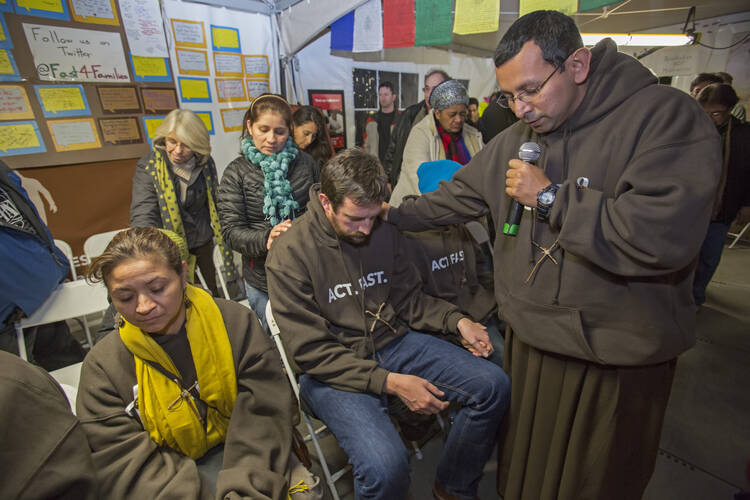It’s usually simplistic to think of an American political party as having a clear agenda for congressional elections. Typically, both parties are fine with candidates doing whatever works to win the handful of competitive districts. (The announcement of the Republican Party’s “Contract with America” preceded, by about six weeks, its takeover of both houses of Congress in 1994, but it probably influenced more journalists than voters.) This time, however, the Republican majority in the House has been so reluctant to send bills to the White House that the passage of any major legislation is likely to dominate the fall campaign.
This means a rift in the GOP between those who want to sit tight and protect their conservative majority in the House and those who want to broaden the party’s appeal in Senate and presidential elections. Given the party’s low standing among Hispanic and Asian voters, immigration reform is an obvious priority for the latter group, and some House leaders are open to a plan that would give legal status to the 11 million undocumented residents in the U.S. (but not citizenship, as that would include the right to vote). Finally resolving the status of people living in the U.S. illegally would help the Republican Party’s image not only among immigrants, but among native-born Americans who know immigrants as neighbors, co-workers, family members, and fellow churchgoers. (Polls consistently show that a majority of Americans support a path to citizenship for undocumented residents.)
But immigration reform does not appeal to Republicans who think they’ve already won this fall’s elections. New York magazine’s Margaret Hartmann acidly comments that even an immigration reform plan tailored to Republican sensibilities — one that stresses “border security,” rules out full citizenship, and denies access to social welfare programs — is meeting resistance as bad political strategy:
“This is really a suicide mission for the Republican Party,” Representative John Fleming of Louisiana told the Associated Press. “While we’re winning in the polls, while ‘Obamacare’ is really dismantling, big government concepts of Democrats and Obama disintegrating, why in the world do we want to go out and change the subject and revive the patient?”Sure, it’s a huge problems that affects millions of people, but if it’s not going to score Republicans any votes, why bother?
Conservative thought leaders are having similar reactions. In an interview with NPR's Rachel Martin, National Review editor Rich Lowry said that supporting immigration reform this year would not help Republicans with Hispanic voters (pointing out that Ronald Reagan’s signing of an immigration reform law in 1986 did not help the party with that voting bloc). He also said that supporting anything short of full citizenship would backfire on Republicans (i.e., doing nothing at all would be preferable):
I think, politically, even if you pass a bill that has no path to citizenship and the president signs it into law, Democrats will immediately will start, understandably, pounding away at Republicans, saying, look, you want to have this permanent class of basically second-class citizens that you're blocking from citizenship in this country and, you know, how is that going to go over with Latino voters if that's the Republican position?
Weekly Standard editor William Kristol is also in the “do nothing” camp. He even argues that a vote on immigration reform could cost Republicans the House, via a far-fetched scenario based on large numbers of Americans finally — finally! — breaking their habit of voting for candidates who can win:
Grassroots activists around the country are now going to make sure there’s an anti-amnesty independent candidate on the general election ballot, in case GOP incumbents sell out after the primaries. And if GOP leadership proceeds with this unique combination of cynicism and recklessness, who could blame some voters for supporting such an independent candidate in November?Which could well mean ... Speaker Pelosi.
But it’s the New York Times’s Ross Douthat who, intentionally or not, gets at the real fault line in American politics. Here is his objection to immigration reform:
A reasonable compromise, for instance, would condition amnesty for illegal immigrants on substantial new enforcement measures, to ensure that this mass legalization would be the last. But the bills under discussion almost always offer some form of legal status* before enforcement takes effect, which promises a replay of the Reagan-era amnesty’s failure to ever deliver the limits on future immigration that it promised.
*Link is to Mickey Kaus in The Daily Caller, who writes, “The undocumented have been waiting ‘in the shadows’ for 25 years. They can wait 5 more while we implement a few measures to prevent another surge of additional undocumenteds (like the one that came after the 1986 amnesty).”
Douthat’s implication is that higher levels of immigration since 1986 — or from its low point in the 1970 Census — has been bad for America, a thesis whose validity depends on where you live. Many Northern cities (including New York, Chicago, Philadelphia, and Boston) reversed what had seemed to be permanent decay when their foreign-born populations climbed back to robust levels. Last year, seven states would have lost population if not for their gains in foreign-born residents: Connecticut, Illinois, Michigan, New Jersey, New York, Pennsylvania, and Rhode Island. All were solidly blue in the 2012 presidential elections, which may make Republican strategists even more wary about supporting any immigration reform that leads to more voters in those states.
On the sidelines of this political debate are what Philadelphia Archbishop Charles Chaput calls “a permanent underclass of human beings who build our roads, pick our fruit, clean our hotel rooms and landscape our lawns.” (See “Two Bishops on Two Problems: Immigration Reform and Just Wages.”) Can they wait until after another election to learn their fates? Do they have a choice?
Photo: Franciscan Brother Juan Turios of Action Network prays Nov. 30 with immigration reform advocates taking part in "Fast for Families" in a tent on the National Mall near the U.S. Capitol in Washington. (CNS photo/Jim West)








